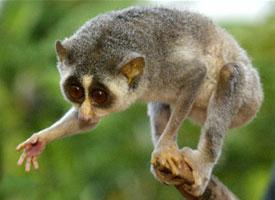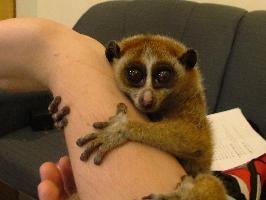
Známé také jako
- Lori ryšavý
- Loris ryšavý
- Outloň ryšavý
Váhy a míry
| Délka | od 18 do 26 cm |
|---|---|
| Hmotnost | od 85 do 350 g |
Biologická data
| Počet mláďat | 2 - 3 |
|---|
Stav ohrožení
| Ohrožen |
Popis zvířete
The Red Slender Loris (Loris tardigradus) is a captivating small primate that belongs to the family Lorisidae. This species is predominantly found in the tropical rainforests, scrub forests, and dense thickets of Sri Lanka, thriving in the lush canopies that provide it with shelter and food. Characterized by its distinctive reddish-brown or rust-colored fur, the Red Slender Loris is a nocturnal creature, primarily active during the night when it embarks on its quest for food and exploration.One of the most striking features of the Red Slender Loris is its large, round, and expressive eyes that dominate its face, glowing enchantingly in the dark. These eyes are specially adapted to the nocturnal lifestyle, allowing the loris to see clearly in low light conditions and spot prey or predators from a distance. The animal's small, rounded head is complemented by a pair of thin, delicate ears that are almost hidden by its fur.
The body of the Red Slender Loris is lean and flexible, an adaptation that aids in its arboreal lifestyle. It possesses long, slender limbs and hands that are specially adapted for gripping branches, with opposable thumbs that enhance its ability to grasp tightly and move with agility through the trees. The fingers and toes are equipped with rounded pads, increasing traction and making this primate an expert climber and an adept hunter of insects and small vertebrates.
Despite its delicate appearance, the Red Slender Loris is a skilled predator. Its diet mainly consists of insects, small birds, eggs, and occasionally, fruits and leaves. Its method of hunting is both fascinating and efficient; it moves slowly and stealthily, minimizing any noise or sudden movements that could alert its prey, before swiftly grabbing its meal with a quick and precise movement.
The Red Slender Loris leads a mostly solitary life, with individuals coming together only for mating or occasionally foraging in small groups. Communication among these primates is primarily through vocalizations, body postures, and facial expressions, which play a crucial role in social interactions, especially during the breeding season.
Unfortunately, the Red Slender Loris is facing numerous threats that have led to a significant decline in its population. Habitat loss due to deforestation, fragmentation of forests, and human encroachment for agricultural purposes are some of the primary challenges. Additionally, they are caught and traded illegally as pets and used in traditional medicine, further endangering their existence.
Conservation efforts are underway to protect the Red Slender Loris and its habitat, including legal protection, habitat restoration, and public education campaigns to raise awareness about the species and its ecological importance. Research and monitoring are also crucial for understanding the needs of this species and implementing effective conservation strategies.
In summary, the Red Slender Loris is a remarkable and enchanting primate with unique adaptations that allow it to thrive in the nocturnal world. However, it is also a species facing significant threats to its survival, requiring concerted efforts from conservationists, governments, and communities to ensure it continues to grace the forests of Sri Lanka for generations to come.
Podobná zvířata
Nové fotografie zvířat
Top 10 zvířat
- Dolphin gull (Leucophaeus scoresbii)
- Stone loach (Barbatula barbatula)
- Diana monkey (Cercopithecus diana)
- Japanese macaque (Macaca fuscata)
- Greek tortoise (Testudo graeca)
- Galápagos tortoise (Geochelone nigra complex)
- Moustached guenon (Cercopithecus cephus)
- Russian tortoise (Testudo horsfieldii)
- Galápagos penguin (Spheniscus mendiculus)
- Common flying dragon (Draco volans)
